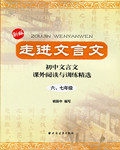题目内容
A few years ago, I took a sightseeing trip to Washington, D.C.Standing outside the Ronald Reagan Center, I heard a voice say, “Can you help me?” When I turned around, I saw an elderly blind woman with her hand extended.In a natural reflex (反应), I reached into my pocket, pulled out all of my loose change and placed it on her hand without even looking at her.I was annoyed at being bothered by a beggar.But the blind woman smiled and said, “I don’t want your money.I just need help finding the post office.
In an instant, I realized what I had done.I judged another person simply for what I assumed she had to be.I hated what I saw in myself.This incident re-awakened my belief in humility (谦恭), even though I’d lost it for a moment.
The thing I had forgotten about myself is that I am an immigrant.I left Honduras and arrived in the U.S.at the age of 15.I started my new life with two suitcases, my brother and sister, and a strong, serious-minded mother.Through the years, I have been a dishwasher, mechanic and pizza delivery driver among many other humble jobs, and eventually I became a network engineer.
In my own life, I have experienced many open acts of prejudice (偏见).I remember a time, at age 17 — I worked as a waiter, and I heard a father tell his little boy that if he did not do well in school, he would end up like me.I have also witnessed the same treatment of my family and friends, so I know what it’s like, and I should have known better.
But now, living in my American middle-class lifestyle, it is too easy to forget my past, to forget who I am and where I have been, and to lose sight of where I want to be going.That blind woman on the streets of Washington, D.C., cured me of my blindness.She reminded me of my belief in humility and to always keep my eyes and heart open.By the way, I helped that lady to the post office.And in writing this essay, I hope to thank her for the priceless lesson.
1.We can learn from the first two paragraphs that________________________________.
A.the author regretted his act of prejudice
B.the blind woman needed the money badly
C.the author was as poor as the blind woman
D.the author was a native American
2.According to Paragraph 4, hearing the father’s words, the author was probably________.
A.rather hurt B.very excited C.deeply moved D.greatly inspired
3.According to the passage, the author probably agrees that one should_______________.
A.be nice to the elderly and the disabled
B.try to experience different kinds of life
C.treat others equally with love and respect
D.think about one’s past as often as possible
4.Which of the following can be the best title for the passage?
A.Learn from Your Past B.How My Dream Comes True
C.A Belief That Will Never Change D.A Priceless Lesson in the Street
1.A
2.A
3.C
4.D
【解析】
试题分析:
1.这是事实推理题。根据In an instant, I realized what I had done.I judged another person simply for what I assumed she had to be.I hated what I saw in myself.可知作者意识到了自己的偏见。故选A。
2.这是推理理解题。根据I heard a father tell his little boy that if he did not do well in school, he would end up like me.可知,当时那个小孩的父亲把作者当成了反例来教育孩子,作者可能受到了很大的伤害。故选A。
3.这是推理理解题。帮助盲人这件事并不大,但作者深刻反省,认识到不应该对弱势群体持有偏见。C项说法与作者的意图一致。故选C。
4.这是归纳标题题。主要根据在末段第二、三句That blind woman…of my blindness.She reminded me...and heart open. 关键词语是末段第二句的on the streets和最后一句的the priceless lesson。故选D。
考点:这是一篇记叙文。
点评:一位上了年纪的女盲人在街头向作者求助,作者却想当然地认为她是在乞讨。之后作者知道自己错了,羞愧难当,经深刻反省后,端正了思想认识。事实推理题是根据文中的事实来推出一种新的结论。需用考生仔细推敲文章的大意。

 走进文言文系列答案
走进文言文系列答案 ),并在其下面写出该加的词。
),并在其下面写出该加的词。 ),并在其下面写出该加的词。
),并在其下面写出该加的词。